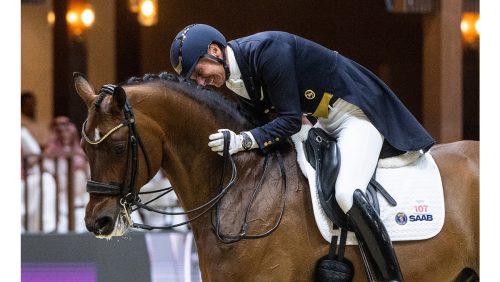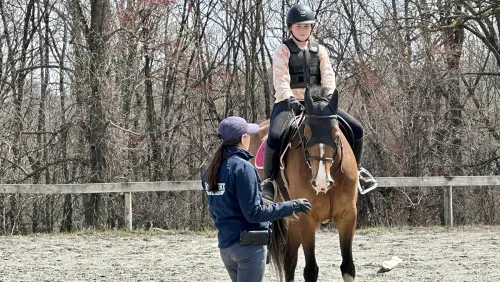Danny is 8 this year. He’s always been wildly talented; I bought him in June of his 6-year-old year, by which time he could do big clean changes, a few half steps and a passagey trot that, while all will be handy one day, I had to basically sit down and take out of him because he’d learned a mechanism that wasn’t what I wanted at Grand Prix, one where he pushed his big powerful hind legs out behind and made them slow, instead of really sitting and being snappy. But more importantly, what I loved about him at 6 was that I could take a hold of the reins, clamp my legs on, pester him a bit with a stick, and not get dumped.
Well… mostly not get dumped.
The first time was about the whip. It was early fall of last year, and I’d been spending more time on the canter than on the trot because, at that time, the trot was more developed, and I wanted to make some progress on his weakness. I felt I had, that he’d plateaued a little bit, and I wanted to go back to the trot for a while to feel like I was making progress.
I was playing with the half steps, not even thinking about AND NOW WE PIAFFE but more just that I could compress and expand the trot in a really boring way, and he backed off and kicked out a bit, and I sat down and said hey, c’mon, and he double-barrel kicked out behind, ducked left, and plopped me on the ground.
I could tell you that it was because my timing was off. I could tell you that it was in the corner of the ring by the tree where the birds hang out, and Danny doesn’t like birds. I could tell you that he didn’t yet understand what I was asking, and got confused. And all of these things are probably true.
ADVERTISEMENT
But at the end of the day, what actually happened is that my darling teenaged Danny decided he was done trying hard for me in that moment, and then told me where I could shove it.
I expect teenage cheek. I actually cherish it, because generally speaking I’ve found a connection between the thing that makes a horse tell me to go pound sand at 7 years old is the thing that lets them piaffe 15 steps with no whip when they’re 12 years old. And of course whenever a horse I’m riding starts behaving in a resistant faction, my first point of action is always to make sure that he’s 100 percent healthy and sound, and also that my aids are 100 percent clear and 100 percent fair.
But I draw this line in the sand, where from 3 or 4 or whatever age they are when they come to me, and usually 9 or 10, when I’m allowed to do whatever I want (within, of course, obvious reason), and they have to like it, or at least accept it.
And sometimes that ride isn’t fun to watch. Not because we’re being unfair, or having to use strong aids. But Midgey spent a fair amount of time on his hind legs at 6 and 7 and well into 8 years old. Fender ran backwards every day—and I mean EVERY DAY—at 7 and 8 about the notion of really collected canter, heading towards the canter pirouette. Johnny would just stop. Dorian would just jig.
And in those moments of resistance, the rider has two options. One is to change the subject, to go and do other things. For me, this isn’t the answer. I’ve heard Steffen Peters refer to this as “kicking the can down the road,” because it doesn’t make the problem go away, it just means it’s going to be exactly the same amount of trouble later, if not a bigger problem, because the horse will be x times stronger, fitter, and cleverer at avoidance tactics.
The other option is to take it on, and not back down until it’s dealt with, whether that’s a 5-minute come-to-Jesus, or weeks and weeks of quietly sticking it out while they do things like, for example, get grumpy, spook at a bird, and drop you in the dirt.
ADVERTISEMENT
We make these course corrections not through violence, but through patience. We get our horses through the adolescent temper tantrums and the misunderstandings not by roughness, but by clarity, and by persistence. We get what we want by outlasting them. But we have to take it on, and we have to see it through to the other side, as long as that process takes.
I’m so lucky to have clients and owners who understand that the path up the levels is not linear. I’m so lucky to have clients and owners who understand that if it’s all going perfectly, it’s a problem; that the resistance, the coping skills, the getting told what to do part of it all is what makes successful horses. I just saw a thing going around Facebook that said that uncoachable kids, in youth sports, become unemployable adults. The same is true of horses.
It’s not easy, it’s a journey. It’s a sport, not a classroom. And telling Danny that he had to try, and that “because I said so” was the only reason he’d ever need, at 6 years old, has let him figure out how to do this at 8 years old. I believe he’ll be a very employable adult.














